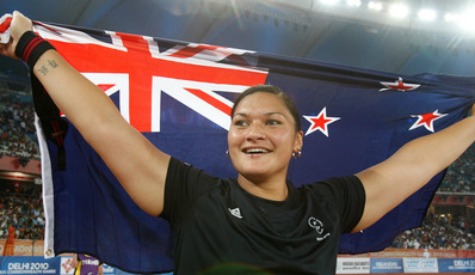 New Zealand has won its sixth gold medal of the Olympics after Valerie Adams' rival Nadzeya Ostapchuk tested positive for drugs and was stripped of gold.
New Zealand has won its sixth gold medal of the Olympics after Valerie Adams' rival Nadzeya Ostapchuk tested positive for drugs and was stripped of gold.
The dramatic development occurred just hours after the curtain came down on the 30th Olympiad in London.
Ostapchuk tested positive test for metenolone, an anabolic agent.
The result means the 27-year-old Adams has won gold at successive Olympics. It lifts
New Zealand one place on the medal table to 15th, ahead of Cuba and is our second best gold haul, just behind the eight of Los Angeles in 1984.
New Zealand's total medal haul of 13 equals the country's best ever, achieved at the Seoul games of 1988.
On Tuesday morning, Adams finished second behind Ostapchuk, her throw of 20.7m well behind the Belarusian's 21.36m.
Adams was driving to coach Jean-Pierre Egger's house in Switzerland when she heard the news she was again the Olympic champion. "I just burst into tears," she said early today. "I fell into JP's arms and we shared the moment. It's a lot for me to take in at the moment."
Of her rival, Adams said she was "history". "My feeling is I don't want to waste any energy on her. I just want to enjoy the moment."
Adams said she had noticed the extraordinary throws Ostapchuk had thrown before the Olympics, "but I never wanted to assume. Other people have made comments about how she looks and how she throws".
The New Zealander hit out at Ostapchuk's unveiling as a drugs cheat. "It is also encouraging for those athletes like myself who are proud to compete cleanly that the system works and doping cheats are caught."
Adams admitted she felt robbed by the fact that the people she cares about did not get the chance to see her on the top step of the podium and hear the New Zealand anthem.
Her Olympic campaign was clouded by an administrative error that saw her name missing from the official start list. Only an 11th-hour intervention by the NZ Olympic Committee and the International Association of Athletics Federations (IAAF) enabled Adams to attempt to defend the title she won in Beijing.
Adams said the bungle messed with her head and she threw poorly during the final.
Intriguingly, Egger offered an enigmatic appraisal of Ostapchuk's performance, saying he "would prefer to remain silent".
The implication was that something was amiss about the Belarusian's rapid improvement. It was the first time she had beaten Adams in nearly two years.
Ostapchuk, 31, was first tested by urine sample the day before competition and again straight after the final. Both samples showed up the presence of metenolone.
The drug is a long-acting anabolic steroid, which boosts cellular tissue in muscles and stimulates male characteristics. It is taken orally or through injection.
Late last night, the Wikipedia entry for the drug was already saying it was the preferred anabolic of Nadzeya Ostapchuk.
Adams' New Zealand teammates were ecstatic when they learned she would get the gold after all.
"Everyone cried - it was pretty emotional," said Annalie Longo, a member of the women's football team, as she left the athletes village. "We're just so happy, she worked so hard and she totally deserved the gold medal."
She expressed regret that Adams had not been able to receive the gold medal at the victory ceremony.
"We feel cheated in a way, not being able to play the anthem and having taken the moment off her," Longo said.
Brett Addison, sport manager at Athletics New Zealand, said the gold medal was fantastic news for Adams and justification of her rating as the top shot-putter in the world.
He said Ostapchuk's vast improvement from last June, when Adams beat her by more than one metre, had raised some questions.
"She went back to Belarus and had some amazing throws, so there were some questions raised then. But unless an athlete tests positive you can't really say anything."
New Zealand Olympic Committee Secretary General Kereyn Smith said Adams' honour was well deserved. She added that New Zealand athletes were proud to compete cleanly on the world's stage.
The chef de mission of the New Zealand team, Dave Currie, said the news was wonderful and he was very proud of Adams.
The IOC Disciplinary Commission disqualified Ostapchuk, withdrew her medal and asked the IAAF to change the result.
The silver medal now goes to Russian Evgeniia Kolodko and the bronze to Lijiao Gong of China.
During the Games, the IOC carried out tests on the top five finishers in each event, plus two others at random. Around 3800 urine and 1200 blood samples were taken.
Nine athletes returned positive tests, but only Ostapchuk has been stripped of a medal.
By Andrew Alderson, David Leggat and Dylan Cleaver
Source: www.nzherald.co.nz

